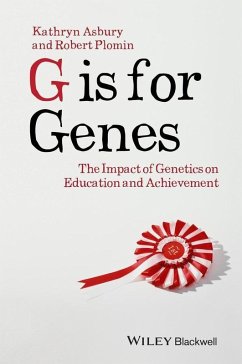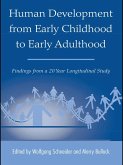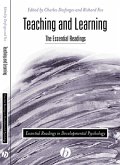G is for Genes shows how a dialogue between geneticists and educationalists can have beneficial results for the education of all children--and can also benefit schools, teachers, and society at large. * Draws on behavioral genetic research from around the world, including the UK-based Twins' Early Development Study (TEDS), one of the largest twin studies in the world * Offers a unique viewpoint by bringing together genetics and education, disciplines with a historically difficult relationship * Shows that genetic influence is not the same as genetic determinism and that the environment matters at least as much as genes * Designed to spark a public debate about what naturally-occurring individual differences mean for education and equality
Dieser Download kann aus rechtlichen Gründen nur mit Rechnungsadresse in A, B, BG, CY, CZ, D, DK, EW, E, FIN, F, GR, HR, H, IRL, I, LT, L, LR, M, NL, PL, P, R, S, SLO, SK ausgeliefert werden.
"G is for Genes" is a controversial book and this isexactly why it certainly makes an interesting reading." (Birth Defects Research Part A: Clinical And MolecularTeratology, 15 December 2014)
"This is a most important book for educationists,teachers, psychologists, parents and learners." (South West Review, 1 June 2014
"G is for Genes is an easy-to read book for a generalaudience, providing an extensive overview of findings frombehavioral genetic studies related to education andachievement." (Twin Research and Human Genetics,1 May 2014)
"In sum, G Is for Genesis an admirable effort by twoauthors who are excellent translational scholars. It alights on anumber of important educational issues and does so in a reasonedand constructive manner." (PsycCRITIQUES, 7April 2014)
Link to TheGuardian - 18 February 2014
"This book breaks down complex science in an engaging andaccessible way so that the wider audience can enjoy reading aboutgenetic research, molecular biology, genome screening and mostrelevantly the implications for education." (EarlyYears Educator, 1 February 2014)Link to BBC -The Forum - 11 November 2013
Link to TheEconomist - 30 November 2013
"This book breaks down complex science in an engaging andaccessible way so that the wider audience can enjoy reading aboutgenetic research, moelecular biology, genome screening and, mostrelevantly, the implications for education." Early Years Educator,February 2014
G is for Genes opened my eyes to how genes influence, butnot determine, the academic pathways of our children. It should bemandatory reading for parents, teachers, and policy-makers. Thebook is engagingly well-written, never condescending, yet addressesthe key findings from the last decades of geneticsresearch.
--Professor Rob Klassen, Psychology in Education ResearchCentre, University of York
The g-word has been a taboo in education. This defies bothscience and common sense, which tell us that children are notindistinguishable blank slates. Kathryn Asbury and Robert Plomin,one of the world's leading behavioral geneticists, show thatan understanding of genes, far from being scary, is indispensableto sound educational policy, promising schools that are both moreeffective and more humane. This may be the most important bookabout educational theory and practice in the new millennium, givingeducators, policy-makers, and parents much to think about.
--Steven Pinker, Johnstone Family Professor of Psychology,Harvard University, and the author of How the Mind Works and TheBlank Slate.
Education has changed little over at least the last sixcenturies. Until everybody concerned with education -administrators, teachers, and parents - understand the materialclearly presented in this book, education will not change. Understanding genetic differences and the effect ofenvironments on them is an essential beginning for any revolutionin education.
--Douglas K. Detterman, Louis D. Beaumont UniversityProfessor Emeritus, Case Western Reserve University
"This is a most important book for educationists,teachers, psychologists, parents and learners." (South West Review, 1 June 2014
"G is for Genes is an easy-to read book for a generalaudience, providing an extensive overview of findings frombehavioral genetic studies related to education andachievement." (Twin Research and Human Genetics,1 May 2014)
"In sum, G Is for Genesis an admirable effort by twoauthors who are excellent translational scholars. It alights on anumber of important educational issues and does so in a reasonedand constructive manner." (PsycCRITIQUES, 7April 2014)
Link to TheGuardian - 18 February 2014
"This book breaks down complex science in an engaging andaccessible way so that the wider audience can enjoy reading aboutgenetic research, molecular biology, genome screening and mostrelevantly the implications for education." (EarlyYears Educator, 1 February 2014)Link to BBC -The Forum - 11 November 2013
Link to TheEconomist - 30 November 2013
"This book breaks down complex science in an engaging andaccessible way so that the wider audience can enjoy reading aboutgenetic research, moelecular biology, genome screening and, mostrelevantly, the implications for education." Early Years Educator,February 2014
G is for Genes opened my eyes to how genes influence, butnot determine, the academic pathways of our children. It should bemandatory reading for parents, teachers, and policy-makers. Thebook is engagingly well-written, never condescending, yet addressesthe key findings from the last decades of geneticsresearch.
--Professor Rob Klassen, Psychology in Education ResearchCentre, University of York
The g-word has been a taboo in education. This defies bothscience and common sense, which tell us that children are notindistinguishable blank slates. Kathryn Asbury and Robert Plomin,one of the world's leading behavioral geneticists, show thatan understanding of genes, far from being scary, is indispensableto sound educational policy, promising schools that are both moreeffective and more humane. This may be the most important bookabout educational theory and practice in the new millennium, givingeducators, policy-makers, and parents much to think about.
--Steven Pinker, Johnstone Family Professor of Psychology,Harvard University, and the author of How the Mind Works and TheBlank Slate.
Education has changed little over at least the last sixcenturies. Until everybody concerned with education -administrators, teachers, and parents - understand the materialclearly presented in this book, education will not change. Understanding genetic differences and the effect ofenvironments on them is an essential beginning for any revolutionin education.
--Douglas K. Detterman, Louis D. Beaumont UniversityProfessor Emeritus, Case Western Reserve University









